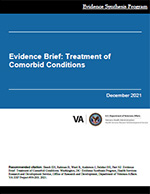
Prepared by:
Evidence Synthesis Program (ESP) Coordinating Center
Portland VA Health Care System
Portland, OR
Mark Helfand, MD, MPH, MS, Director
Recommended Citation:
Beech EH, Rahman B, Ward R, Anderson J, Belsher BE, Parr NJ. Evidence Brief: Treatment of Comorbid Conditions. Washington, DC: Evidence Synthesis Program, Health Services Research and Development Service, Office of Research and Development, Department of Veterans Affairs. VA ESP Project #09-203; 2021.
Download PDF: Brief, Supplemental Materials, Evidence Snapshot
Evidence from recent systematic reviews (SRs) on the treatment of comorbid conditions is sparse and inconsistent. Inconsistent findings across the included SRs may reflect different ways of defining and measuring comorbidity, heterogeneous study samples, and methodological variation across the SRs and their included studies.
Psychiatric comorbidity in Veterans is widespread. The impact of comorbidity on treatment outcomes is not well understood, and there is debate about the optimal course of treatment of these patients. This review identifies and synthesizes evidence from recent SRs on the effect of the presence of a comorbid condition on treatment outcomes, the effect of treating a primary condition on a comorbid condition, and the effectiveness of integrated treatments designed to treat both conditions.
This rapid review of SRs published in the last 7 years included 26 reviews on the treatment of comorbid conditions. Based on data from a single study, 1 systematic review found that a baseline diagnosis of major depressive disorder significantly predicted nonresponse to posttraumatic stress disorder (PTSD) treatment. However, these findings are limited to a single, imprecise study. Treatment with antidepressants may result in improvements in certain alcohol outcomes in individuals with comorbid depression and alcohol dependence, based on 1 well-conducted SR. The effect of treatment of a primary condition on a comorbid condition reported in 10 other SRs is unclear due to inconsistent, imprecise, and/or indirect findings. The evidence on the effectiveness of integrated treatment compared to nonintegrated treatment was inconsistent among 6 SRs but was most favorable for integrated treatment of PTSD and substance use disorder. The evidence was further limited by imprecise and/or indirect findings.